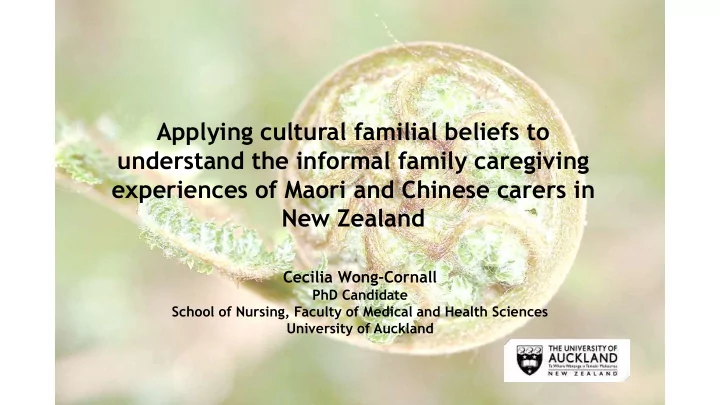

Applying cultural familial beliefs to understand the informal family caregiving experiences of Maori and Chinese carers in New Zealand Cecilia Wong-Cornall PhD Candidate School of Nursing, Faculty of Medical and Health Sciences University of Auckland
Informal family caregiving challenges in New Zealand • Ageing population • Health and social systems’ limitations • “Ageing in place” and “Active ageing” policies/intervention = increasing reliance of informal workforce • 490000 informal carers (StatsNZ, 2014) • Developing health and social system support structure for carers • Evident knowledge gaps
Contemporary New Zealand - an evolving and mobile population Demographic diversity – e.g. growing ethnic minority populations Increased population mobility (overseas and domestic migration) Implications on ageing and caregiving - ideologies, expectations, needs and approaches Culture is one of the factors contributing to caregiving differences experienced by carers from different social, ethnic and cultural backgrounds.
From bi-culturalism to multi-culturalism Tangata whenua Maori The indigenous people of New Zealand 2 nd largest ethnic group Tiriti o Waitangi (The Treaty of Waitangi) Colonisation and historical injustice – social disadvantage and negative health outcomes Chinese settlement Long and established settlement history (since the mid 1800s) Historical discrimination of early settlers (Poll Tax) Significant increase in population size – “recent” migration; diversity within ethnic group
Chinese gold miners at Muddy Creek, Waikaia, by unknown photographer, ca. 1900. Alexander Turnbull Library. 1/2-019165-F
Aim and Methods Aim: To understand how traditional cultural beliefs (whanaungatanga and filial piety) translate into family caregiving practices in contemporary contexts. Methods: Ten cases (interview transcripts) of family carers from Maori and Chinese backgrounds were selected from two separate studies. Whanaungatanga and Filial Piety principles were used in parallel to analyse narratives of family caregiving experiences from the cases. Discussion around contemporary contexts and application of cultural beliefs in caregiving were explored.
Whanaungatanga and family caregiving Whakawhanaungatanga (Durie, 1994; Mitchelson, 2000) Components Manaakitanga Capacity to care; respect; reciprocity Tohatanga Capacity to share; distribution; allocation Pupuri Taonga Capacity for guardianship Whakamana Capacity to empower Whakatakato Capacity to plan ahead
Filial Piety and family caregiving A Confucian principle shared by many East Asian cultures Components Respect Express deep admiration and honour for older family members - translated into obligations and expectations Loyalty Prioritise the needs and wellbeing of the kin group Hierarchy “Five relations”* - specific guidelines for interactions between relationships Continuity of the family Reciprocity in caregiving line Harmony Balancing the capital and wellbeing of the family
Findings One: Relevance of traditions/beliefs Specific components of traditional cultural values important to different individuals Older family members (as carer or care-recipient) identified strongly with some traditional values when compared to younger family members Traditional cultural values influence caregiving expectation and approach e.g. As a form of intergenerational teaching of cultural values Allocation of caregiving responsibility Division of resources and decision making power
Findings two: Contemporary challenges High mobility of family (domestic and international migration) challenged translation of traditional familial caregiving practices Changing family composition (e.g. smaller family size, and mixed cultural families) shaped interpretation of traditional cultural beliefs Evolving gender roles and acculturation (e.g. women balancing work and childcare; family members adopted alternative cultural norms) Resettlement challenges – traditional cultural caregiving practices became impractical/impossible
Picture source: http://thewireless.co.nz/articles/young-carers-at-home-unheard-and-often-alone
Findings three: Intergenerational variation in cultural needs Older family members are keen on retaining their cultural values by having them expressed through family caregiving (expect family to be near and take on the caregiving responsibility) The adult children (“Sandwich” generation) have the difficulty of balancing the negotiating between contextual constraints, changing interpretation of cultural beliefs, providing care for other familial and social roles, and being the family carer for older relatives Younger generations find it difficult to meet and understand expectations of older family members - disruption of family relationship and harmony
Picture source: http://thewireless.co.nz/articles/young-carers-at-home-unheard-and-often-alone
Health and social service implications Increase demographic ethnic and cultural diversity is becoming the norm for most nations. Ethnicity and culture not homogenous. In depth understanding of cultural influences on families’ needs (carers and wider family) is important for developing appropriate and effective health and social support interventions for carers Contemporary systems and policy need to accommodate alternative family caregiving beliefs, preferences and practices More research about ethnic minority carers need to reflect impact of social changes of contemporary contexts
Thank you Acknowledgement: Special thanks to Associate Prof. Nicolette Sheridan, Dr John Parsons, and Associate Prof. Elsie Ho (supervision/advisory team) References: Durie, M.H. (1994). Whänau, Whanaungatanga and Healthy Development. Palmerston North, Massey University. Mitchelson , E (2000). The Development of a Māori Nursing Conceptual Model: Exploratory Research Phase. Auckland, UNITEC Institute of Technology. Statistic New Zealand (2014). 2013 Census QuickStats about culture and identity. Available from www.stats.govt.nz Contact: cwc.wong-cornall@auckland.ac.nz
Recommend
More recommend